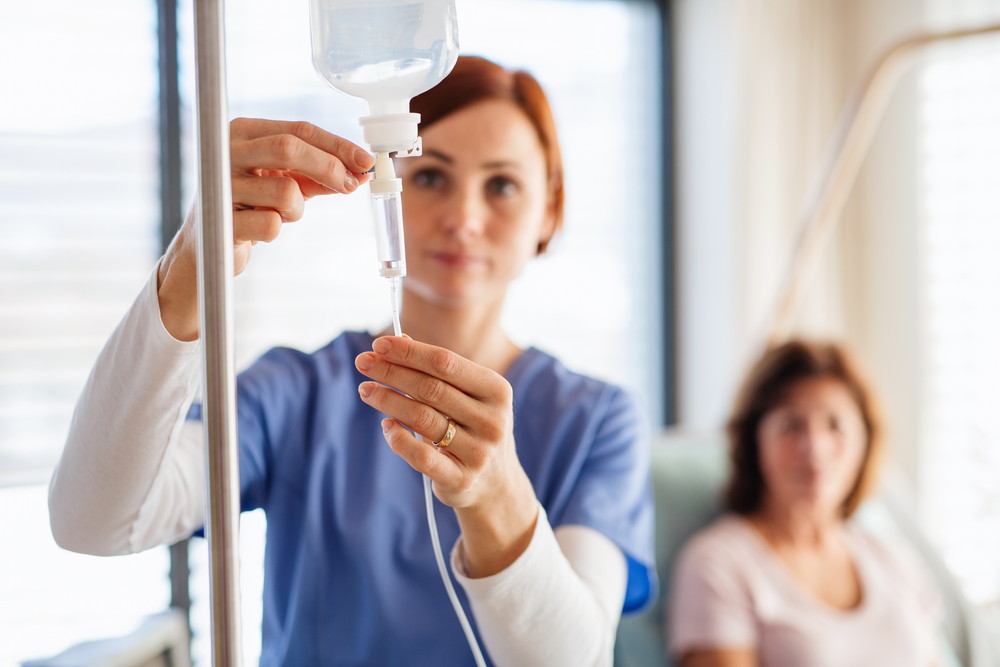Guide to Vivitrol and How It Helps With Alcoholism
Overcoming an alcohol addiction can be one of the hardest challenges you ever do. Even if you’re committed to your recovery, you might continue to struggle with the fear of relapsing. Fortunately, science backed treatments can offer new hope. Vivitrol, an FDA approved drug that does not cause physical dependence, is designed to support your recovery from alcohol use disorder.

Overcoming an alcohol addiction can be one of the hardest challenges you ever do. Even if you’re committed to your recovery, you might continue to struggle with the fear of relapsing. Fortunately, science backed treatments can offer new hope. Vivitrol, an FDA approved drug that does not cause physical dependence, is designed to support your recovery from alcohol use disorder.
Vivitrol for alcohol is a once monthly shot that works by blocking your brain’s reward response. This helps reduce your cravings and desire for alcohol. Unlike medications that require daily dosing, this shot for alcoholism provides consistent support with fewer daily decisions. Vivitrol offers you a powerful tool in the journey toward lasting sobriety.
What Is Vivitrol?
Vivitrol injections are an extended release, injectable form of naltrexone used to treat alcohol and opioid dependence. In contrast to naltrexone, patients have Vivitrol injections administered to them monthly by a healthcare provider. This offers you consistent, long lasting support without the need for a daily pill.
Before engaging in Vivitrol therapy, you should know what Vivitrol is used for. It is FDA-approved to help prevent relapse in opioid use disorders after detoxification and to support your recovery in alcohol use disorder. It blocks the brain’s opioid receptors, but is non-habit forming. This means it does not cause physical dependence or cravings.
Vivitrol injections can be used as part of a broader medication-assisted treatment (MAT) program that includes counseling and behavioral therapies. Vivitrol is a structured evidence-based treatment option when you are committed to achieving and maintaining recovery.
How Does Vivitrol Work for Alcohol Use Disorder?
Vivitrol treatment is an evidence based approach to healing alcohol use disorder. Before beginning treatment, it’s important to answer the question, “How does Vivitrol work?” The answer lies in how it interacts with your brain.
Vivitrol works for the treatment of alcohol use disorder by blocking dopamine receptors. This reduces cravings and supports long-term recovery.
However, Vivitrol works best when it’s combined with evidence-based therapy and counseling. These evidence-based approaches may include cognitive behavioral therapy (CBT), Motivational Interviewing (MI), Contingency Management (CM), and 12-Step Facilitation Therapy.
Each of these therapies plays a crucial role in helping to build your coping skills and reinforce healthy behaviors. The combination of Vivitrol and therapy addresses the biological and behavioral sides of addiction. Vivitrol treatment plus psychosocial support provides a comprehensive path to sobriety and sustainable recovery.
What Is the Vivitrol Shot Like?
The Vivitrol shot for alcohol use disorder is administered by a healthcare provider. Before beginning Vivitrol treatment, you should complete detoxification and, ideally, be alcohol-free for several days to avoid experiencing severe side effects.
The injection is usually given in the gluteal muscle, which is in the buttocks. Getting the shot takes only a few minutes, but you may wonder, “How long does the effects of Vivitrol last?” Each Vivitrol injection releases medication slowly and steadily over roughly 28 to 30 days. This provides you with continuous support throughout the month.
Vivitrol begins working within two hours after receiving the shot, but the full therapeutic effects may take a few days. Vivitrol injections are a convenient option when daily medication is a challenge to your recovery. It offers a reliable way to reduce cravings and prevent relapse with long-acting protection.
Vivitrol vs. Other Treatments
Several FDA-approved prescription medications may be used for the treatment of alcohol use disorder and opioid use disorder. Let’s explore how Vivitrol, Suboxone, naltrexone, and Sublocade compare.
Vivitrol vs Suboxone
When comparing Vivitrol vs Suboxone, it’s important to understand the differences. Suboxone is a combination of buprenorphine and naloxone and works by partially activating opioid receptors. It is only used for opioid dependence and can be started during withdrawal. By contrast, Vivitrol is approved for both opioid and alcohol use disorders.
Vivitrol vs Naltrexone
As you consider Vivitrol vs. naltrexone, it helps to know they share the same active ingredient, but differ in how they are administered. Vivitrol is an extended-release injection given once monthly, while naltrexone is usually a daily pill. Vivitrol provides consistent medication levels throughout the month, which helps improve commitment to your recovery treatment.
Sublocade vs Vivitrol
As you compare Sublocade vs Vivitrol, it is important to know that both are monthly injections, but they treat different conditions. Sublocade contains extended-release buprenorphine and is used exclusively for opioid use disorder. Vivitrol contains extended-release naltrexone and treats both alcohol and opioid dependence. Sublocade partially activates opioid receptors to reduce cravings, while Vivitrol blocks them but does not activate them.
Vivitrol Side Effects and Safety
Vivitrol is generally considered safe, but like all medications, it can trigger side effects. While Vivitrol helps regulate brain chemistry, it does not produce euphoria or a “high.” While Vivitrol can improve mood, it is not classified as a mood enhancer or stabilizer. Overall, the Vivitrol shot is a valuable tool for relapse prevention when it’s used alongside counseling and support services.
Vivitrol shot side effects can include reactions at the site of injection. Rare but serious side effects include liver issues and severe injection site reactions. The following are some of the common Vivitrol side effects you might experience:
- Nausea
- Vomiting
- Headache
- Dizziness
- Fatigue
- Muscle cramps
- Decreased appetite
These common side effects are usually mild and typically subside within the first few days following the injection.
Can You Drink on Vivitrol?
Vivitrol is designed to block the pleasurable effects of alcohol. If you drink while taking Vivitrol, you may not feel the usual “buzz” or euphoria associated with alcohol. The lack of reward may help reduce alcohol misuse. However, while you can drink on Vivitrol, the drug does not prevent intoxication or overdose.
It’s important to understand that Vivitrol for alcoholism works best when combined with a full recovery plan, including counseling and support groups. Relying on the shot alone does not address the underlying issues that contribute to alcohol use. You should work closely with your treatment team to create a comprehensive plan for lasting recovery.
Cost and Insurance Coverage
Your Vivitrol cost depends on several factors, such as your location, financial assistance, and insurance. Without insurance, a single injection may cost between $1,700 and $2,200, depending on the pharmacy and location.

Vivitrol is covered by insurance providers, including Medicaid and Medicare. However, the level of your coverage depends on the policy you purchased and your state.
You should verify your coverage with your insurance provider so you are not surprised by an unexpected medical bill.
Vivitrol provides two important assistance programs. Vivitrol2gether offers patient support services to answer questions, find a provider in your area, and check your insurance coverage. Vivitrol Copay Savings Program can help you with out-of-pocket expenses for your prescription when you are eligible. This can save up to $500 per month.
While Vivitrol may be expensive without insurance, various programs and insurance providers significantly reduce your out-of-pocket Vivitrol cost. You can explore these options to help lower your costs, and if you don’t have insurance, you may be eligible for Medicaid.
Vivitrol FAQs
Vivitrol may help improve your mood indirectly by reducing cravings and preventing relapse while you are recovering from alcohol or opioid dependence. Some people report feeling more emotionally stable during treatment. However, Vivitrol is not an antidepressant and should not replace appropriate mental health care.
Each Vivitrol injection lasts roughly 28 to 30 days. It delivers a steady release of naltrexone to block the effects of opioids or alcohol during that period. You will typically receive a new injection every month to maintain the effectiveness of this prescription medication.
Vivitrol works for alcohol use disorder by blocking opioid receptors in your brain. This reduces the pleasurable effects you may experience from drinking and helps curb cravings. It is a non-addictive, once-monthly injection that should be used alongside counseling and therapy to support recovery.
You can physically drink alcohol while on Vivitrol, but the medication alters your brain’s reward response, which may make drinking less enjoyable. These effects help reduce cravings and support your recovery efforts. The decision to drink while on Vivitrol will depend on your recovery needs and goals.
Yes, Vivitrol is widely covered by insurance, but your coverage specifics can vary by insurance provider and the plan you purchased. You should verify your coverage to understand the potential savings. The Vivitrol Co-pay Savings Program can cover up to $500 per month toward co-pay expenses when you qualify.
Injection site pain, nausea and dizziness are typical side effects of the Vivitrol shot. Rarely, patients may experience serious side effects such as liver damage and allergic reactions. It’s important for you and your healthcare provider to discuss the risks and benefits of using Vivitrol before having it administered.
Insurance coverage can play a factor in the cost of this prescription injection. A single 380 mg injection may cost anywhere from $1,000 to $2,200 without insurance. Nonetheless, most insurance companies offer coverage which can vary by insurance provider and your plan. The Vivitrol Co-pay Savings Program can reduce your out of pocket costs, covering up to $500 per month.
Vivitrol treats alcohol dependence and prevents relapse from opioid dependence after medical detoxification. It works by blocking opioid receptors in your brain, which reduces cravings and the rewarding effects of these drugs. It is administered as a once-monthly injection.
Yes, the Vivitrol shot is effective for treating alcoholism. Studies show it helps reduce heavy drinking days by blocking the brain’s reward system. This makes alcohol less appealing and enjoyable. It works best when combined with counseling and support programs.
While Vivitrol, Suboxone, and Sublocade all treat opioid use disorder, they work differently. Vivitrol first requires detoxification and blocks opioid receptors without causing dependence. Suboxone (buprenorphine and naloxone) partially activates receptors, reducing cravings and withdrawal.
Sublocade is a monthly injection of buprenorphine. Your choice depends on your needs, symptom severity, withdrawal stage, and treatment goals.
Find Vivitrol Treatment Providers Near You
You can locate Vivitrol treatment providers near you by searching a reputable online directory, such as Treatment Centers Directory. There, you can filter the results by facility type and services offered.
The Substance Abuse and Mental Health Services Administration (SAMHSA) also has a treatment locator where you can search for behavioral health services, including providers that offer Vivitrol. For personalized assistance, the Vivitrol2gether Program offers support in finding providers, verifying your insurance coverage, and coordinating care.
More About Alcohol & Treatment

Medical Detox
Medical Detox: Cost, Timeline, & What to Expect For those struggling with substance abuse, medical detox is a critical step

Inpatient Drug Rehab
Inpatient Drug Rehab: What to Expect & How Much it Costs According to the National Center for Drug Abuse Statistics

Outpatient Drug Rehab
Outpatient Drug Rehab: Treatments, Cost, & How to Choose If you or a loved one is dealing with a drug